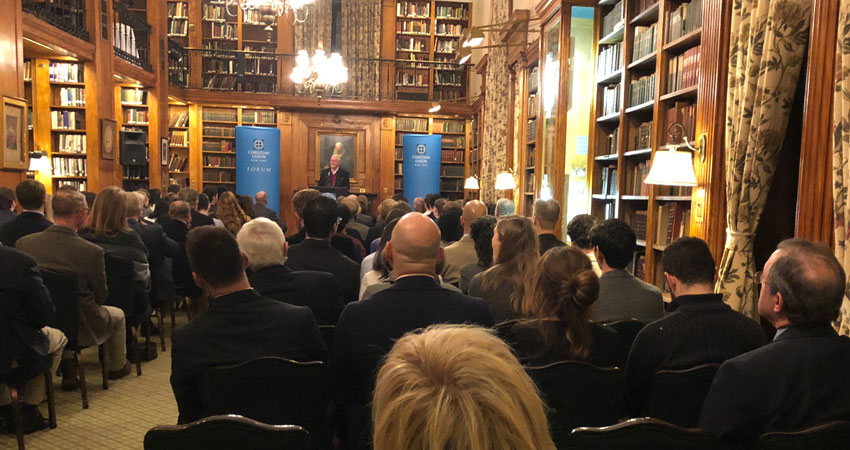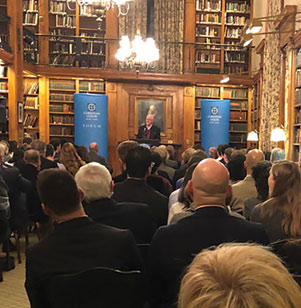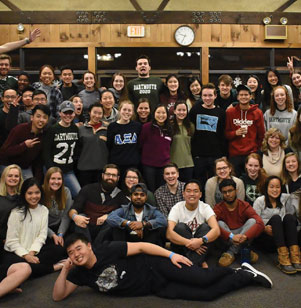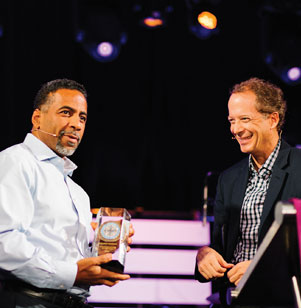Christian Union New York Hosts Os Guinness
by catherine elvy, staff writer
Throughout 2017, in conjunction with the 500th anniversary of the Protestant Reformation, many churches, universities, and institutions explored its far-reaching significance, especially the way it reshaped Christendom and the stream of Western history.
In February, Os Guinness contributed to this ongoing conversation when the prolific author and social critic appeared on behalf of Christian Union New York, a ministry to emerging leaders and professionals. More than 115 people attended the Forum, held in February at The Union League Club.
Scott Crosby, ministry director of Christian Union New York, expressed appreciation for Guinness’ efforts to showcase the critical elements of faith and freedom at the heart of the United States. “As always, Os was both erudite and engaging in his presentation,” Crosby said.
Specifically, Guinness demonstrated expertise in “taking a decisive historical event centered around the Christian church and broader European culture (the Reformation), and delved into the specific implications it had in shaping the American political system and cultural framework.”

Among his vast credentials, Guinness has served as a senior fellow with the EastWest Institute and is co-founder of the Trinity Forum. Since relocating to the United States in 1984, Guinness also has been affiliated with the Woodrow Wilson Center for International Studies and the Brookings Institution.
In assessing the wider impact of the Reformation, Guinness pointed to the wealth of principles that became the heart of the American democratic experiment. Many of the themes behind such principles are rooted in the Old Testament, especially the concept of covenantalism.
Historically, allegiance to intergenerational covenants played a major role in the durability of the Jewish people. “The miracle of Jewish survival is the Torah and covenant,” said Guinness. “It held them through thick and thin.”
In turn, rather than being the result of economic prowess or military might, much of American endurance also comes from its core covenantal nature, or adherence to a morally binding agreement, Guinness noted.
Indeed, the concept of covenantalism was woven into the fabric of Colonial North America, especially in New England where colonists pledged loyalty to one another.
The preambles of the constitutions for Massachusetts and the United States echo the early colonists’ covenantal intent to voluntarily bind themselves in love and respect.
In 1780, John Adams (Harvard 1755), drafted the constitution for the Commonwealth of Massachusetts. In addition to becoming the world’s oldest functioning written constitution, the document served as a model for the U.S. Constitution.
Guinness explained to his audience how the covenants of the Old Testament involved reciprocal responsibility, namely how Jews made binding pledges to the Lord and to one another.
More importantly, relationships formed the essence of the Jewish community, and intergenerational transmission kept the core values alive.
Covenants with God especially were critical because “we are not great promise-keepers,” Guinness said. “It’s by promising that we build trust.” Likewise, faith and freedom require that each generation is intentional in transmitting these ideals to the next.
In contemporary America, covenantalism is a “forgotten secret” of democratic livelihood, said Guinness, who raised rhetorical questions about how much the United States might drift from its roots. “Will America restore what was once there?” Guinness asked. “The saddest thing in America is the crisis of faith in the churches.”
Along with Guinness’ thought-provoking lecture, Christian Union intern Kate Gardner expressed appreciation for the stimulating question-and-answer session that followed his appearance.
Guinness “made a compelling case for the importance of covenant, freedom, and the impact of the Reformers on American democracy,” said Gardner, Princeton ’16.



